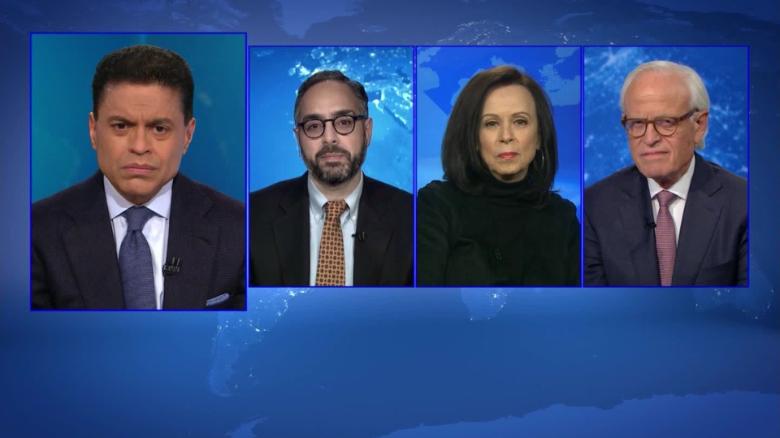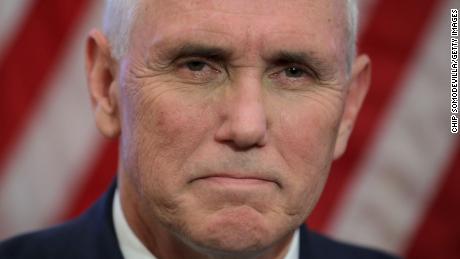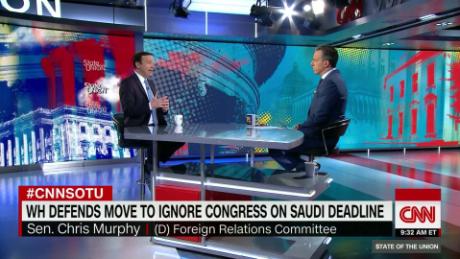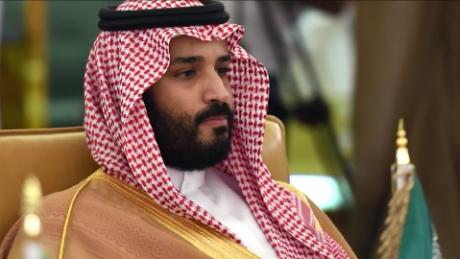Washington (CNN)White House senior adviser Jared Kushner has embarked on a five-nation Middle East tour that could involve his first face-to-face meeting with Saudi Arabia's crown prince since the October 2018 murder of journalist Jamal Khashoggi.
The tour is meant to brief allies on the administration's proposal to end the Israeli-Palestinian conflict, which Kushner indicated Monday will sidestep any attempt to forge a compromise between the two sides and instead focus on allowing "people to have better lives."
"We were unable to convince people from both sides to compromise," Kushner said in an interview with Sky News Arabia aired on Monday. "Therefore, we did not focus a lot on the issues, despite our deep knowledge of them. We focused instead on what prevents the Palestinian people from using their full potential, and what prevents the Israeli people from integrating properly in the entire region"
Khashoggi killing
President Donald Trump's son-in-law is slated to visit oil-rich Gulf countries, including the United Arab Emirates, Bahrain, Oman, Saudi Arabia and Qatar, but not Jordan, which shares a border with Israel.
Kushner is expected to arrive in Saudi Arabia later in the week, according to a source familiar with the trip, but it's not clear whether he will meet Saudi Crown Prince Mohammed bin Salman. The Embassy of Saudi Arabia did not return queries from CNN.
Kushner has come under close scrutiny for cultivating close ties to the powerful Saudi crown prince, who US intelligence services conclude ordered Khashoggi's murder inside a Saudi consulate in Istanbul.
Riyadh has maintained that neither bin Salman, known as MBS, nor his father King Salman knew of the operation to target the Washington Post journalist.
In February, Trump missed a congressionally mandated deadline to determine whether bin Salman is responsible for Khashoggi's killing and report the findings to Congress as well as any decision to impose sanctions.
Instead, Secretary of State Mike Pompeo sent Senate Foreign Relations Chairman James Risch, an Idaho Republican, and the ranking Democrat on the committee, Sen. Robert Menendez of New Jersey, letters that appeared to lay out administration talking points.
Pompeo responded to criticism from lawmakers that the administration is not doing enough in response to the murder of Jamal Khashoggi. "America's not covering up for a murder," Pompeo said during remarks in Budapest, Hungary. The secretary added, "The President's made very clear, couldn't have been more clear, as we get additional information, we'll continue to hold all of those responsible accountable."
In response to the administration's failure to respond, Democratic senators -- including Ron Wyden of Oregon and presidential candidate Kamala Harris of California -- plan to introduce legislation Tuesday demanding the administration share what they know about Khashoggi's killing and requiring a public report from the director of national intelligence within 30 days should the bill pass.
CNN reported in October 2018 that Kushner operated behind the scenes to mitigate the fallout from Khashoggi's murder at the hands of a team of men from within bin Salman's inner circle. Kushner left public explanations to others, intentionally remaining in the background that week.
In an October interview with CNN's Van Jones, Kushner echoed the Trump administration's core argument, as it continued to stand by the Saudis and -- in Trump's case -- raise doubt about bin Salman's involvement, despite US intelligence conclusions.
'A rough place'
"We have to be able to work with our allies, and Saudi Arabia has, I think, been a very strong ally in terms of pushing back on Iran's aggression," Kushner said.
"The Middle East is a rough place. It's been a rough place for a very long time," Kushner said, adding that, "We have to be able to pursue our strategic objectives. But we also have to deal with what is obviously a terrible situation."
Kristin Diwan, a senior resident scholar at the Arab Gulf States Institute, said the administration clearly values the bond between the two young men.
"Clearly, the White House, led by Kushner, feels that the relationship is key to the two main priorities of the Trump administration: pressuring Iran and securing a peace deal" between Israel and Palestine, Diwan said.
Diwan said Kushner and bin Salman seemed to have a "unique relationship, there's a generational bond there" as well as a "willingness and an eagerness" to reach accommodations on Israel and Iran, Saudi Arabia's regional arch rival.
MBS as asset
Diwan noted that "the King is much more circumspect about what the US is trying to do with the Palestinian peace deal" and was not happy about the US decision to move its embassy to Jerusalem, or recognize the city as Israel's capital. Both steps were controversial as they run counter to international consensus that fraught issues between Israelis and Palestinians such as the fate of Jerusalem should be dealt with toward the end of final negotiations.
"I think we can see some separation of the King and MBS on these issues," Diwan said. That stance would make bin Salman a key ally for Kushner's efforts.
Kushner and Jason Greenblatt, the special representative for international negotiations who formerly served as Trump's personal lawyer, will share details of the economic portion of their peace plan with several wealthy Arab countries, as they look to secure Gulf allies' financial support.
The Gulf funding would be used to boost the Palestinian economy, if Israelis and Palestinians reach a political settlement.
Kushner's presentations will be the most significant to date of the closely held peace plan, the source said, but they are not expected to outline details of the broader proposal, maintaining a silence that has frustrated diplomats in the region and Europe.
Kushner told Sky that it's crucial for details of the peace plan remain "confidential," adding that "in the former negotiations we conducted, we found that many details were coming out before maturing, causing politicians" to leave the plan.
At a conference on the Mideast co-hosted by the US and Poland and held in Warsaw earlier this month, Kushner told attendees that he would not release the plan prior to Israel's elections in April, according to a senior administration official present in the room.
Major US allies hope to see the plan early so they can identify snags or build support, but they have been met with total silence that has left them frustrated. These allies very much want to help out in the process if they can, but feel left out and many have voiced frustration.
One concern these allies have is that they will learn about the substance of the plan so late in the game that it's impossible to weigh in with changes -- and that means it could be something they can't support.
Kushner told Sky News Arabia on Monday that they "tried to find realistic and fair solutions to these issues in 2019 to allow people to have better lives" and that they focused on four key principles to do so.
Freedom and security
"First is freedom, we want people to have freedom," Kushner said. "Freedom of opportunities, religion, worship regardless of their beliefs, in addition to respect."
"The dignity of people must be preserved and they should respect one another and to make use of the available opportunities to improve their lives without allowing old conflicts to highjack the future of their children," Kushner said, "and finally security."
One source familiar with discussions between countries said Arab countries are particularly concerned about their lack of visibility on the non-economic parts of Kushner's proposal. Arab countries "have to feel that they are co-owners of this thing, they have to be privy" to the substance of the plan, the source said.
That source cautioned that while almost nothing is known about the plan, it is expected to skew heavily in favor of Israel and is expected to use non-legal language, not the internationally established and accepted jargon associated with past peace proposals.
The style and choice of the language, the source said, is an attempt to speak directly to Palestinians in the hope that they can be used to pressure Palestinian leaders to accept the plan. It is not expected to mention a two-state solution, the source said, but explains how Palestinian self-determination will manifest itself.








